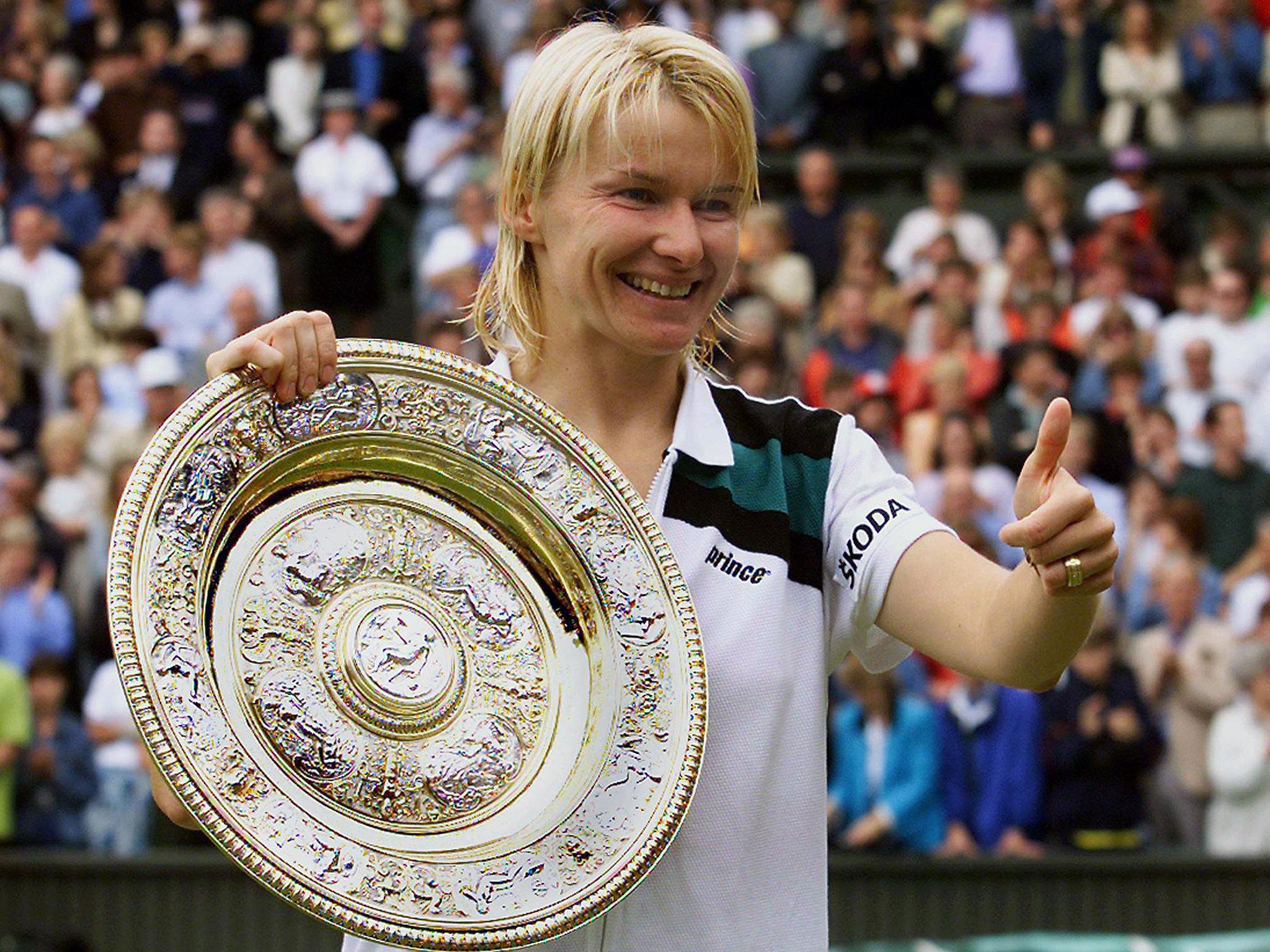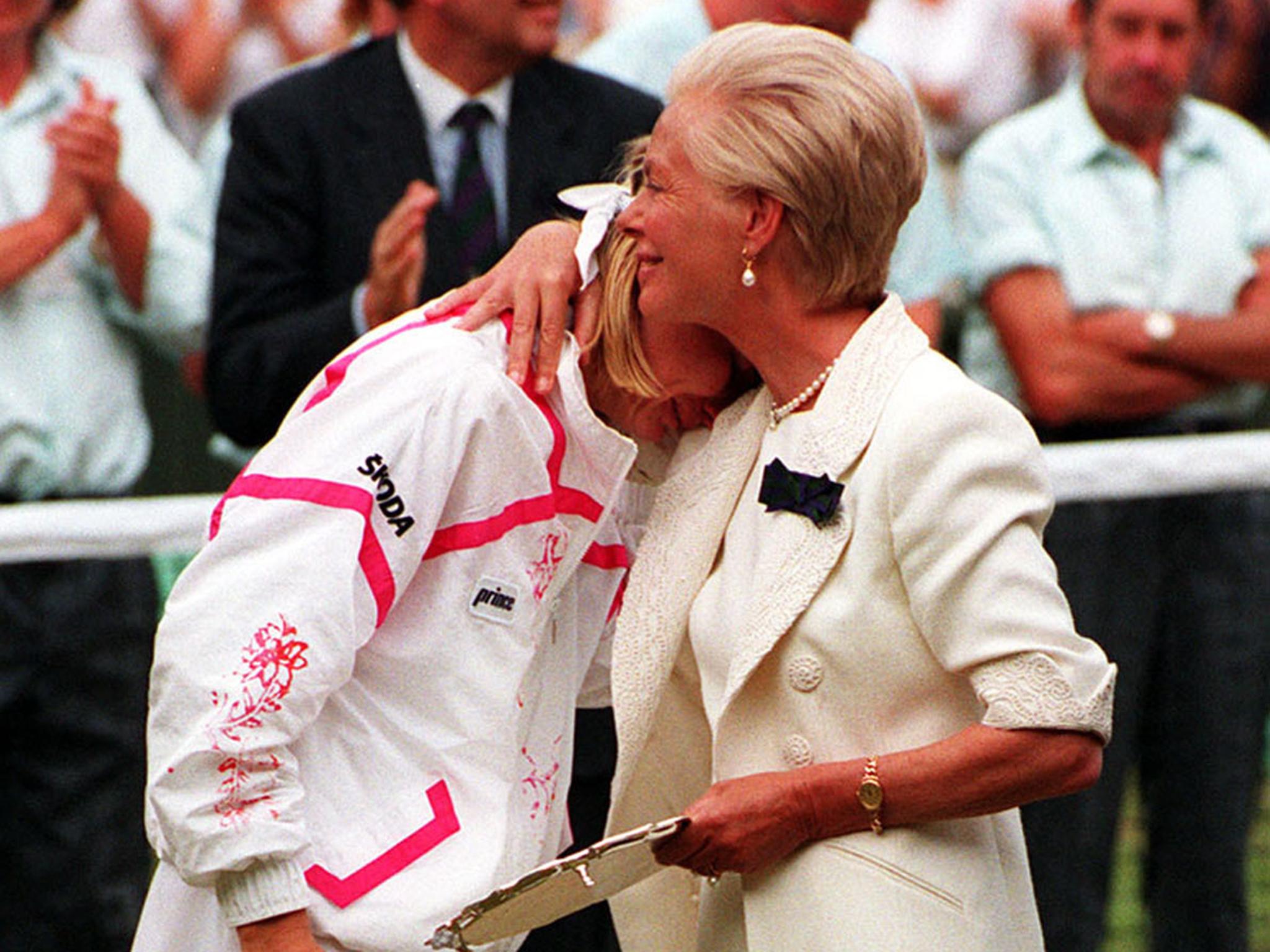Jana Novotna: Czech tennis player who won Wimbledon in a huge comeback she was never given credit for
In 1991 she ended Steffi Graf’s dominance at the Australian Open but never lived down being crushed by her two years later at the All England Club – even when she won there in 1998

When Jana Novotna lost the Wimbledon final to Steffi Graf in 1993, she famously used the Duchess of Kent’s shoulder to cry on. It was one of the most poignant moments in televised tennis – an image so powerful it came to define her career.
Some observers believed she had caved in during the match while the player herself maintained she had lost her rhythm.
“Novotna blasted her second serve three feet out,” wrote The Independent’s Simon O’Hagan at the time. “Deuce. Then a simple volley that landed about six feet out. Advantage Graf. Finally, a smash that wasn’t even close to getting over the net. Game Graf. 2-4. Within 15 minutes it was 6-4 to Graf, and one of the great ‘bottle jobs’ was complete.”
The British player Sue Barker agreed: “No player wants to be thought of as a bottler, and if you’d asked me on the morning of the final whether I thought Jana was one, I wouldn’t have said so ... she’ll have to work twice as hard to lose it.”
Work Novotna did but she remains remembered not for winning Wimbledon in 1998 but for losing to Graf five years earlier.

The Czech player, who has died of cancer aged 49, retired in 1999. She was ranked number two in the world at her peak, renowned as an instinctive serve-volleyer who lived for the game.
In 2005 she was inducted into the International Tennis Hall of Fame, after having notched 100 career titles, including 24 for singles and 76 for doubles.
As an Olympian, she won the silver medal in the women’s doubles at both the 1988 Games in Seoul and the 1996 Games in Atlanta, where she also took bronze in the women’s singles.
After her famous loss to Graf, Novotna received the runner-up plate from the Duchess of Kent who, in consoling her, said: “I know you will win it one day, don’t worry”.
Five years later, aged 29, she did, defeating Nathalie Tauziat of France, 6-4, 7-6, (7-2) – the first and only time she was to lift the Wimbledon singles trophy.
After turning pro as a doubles player in 1987, she went on to clock 16 Grand Slam doubles and mixed doubles titles – and took the rare turn of establishing herself as a singles player as an adult in 1990.
Her Wimbledon victory in 1998 came after she beat Martina Hingis of Switzerland in the semi-final, having lost to her a year earlier. She had beaten Venus Williams in the quarter-final.
At the age of 29, this made her the “oldest winner of a first major singles title in history” – this time the Duchess of Kent was witness to her happy tears.
In 1991, Novotna ended Graf’s three-year, 25-match reign at the Australian Open. She later said that was something “I always treasure”, adding Graf “was winning her matches in 35, 40 minutes”.
She listed Graf and Monica Seles as the greatest players she ever faced. Her tennis hero was Martina Navratilova, whose footsteps she followed in becoming a “super-coach”. She also commentated for the BBC.
In an interview in 2015, she said: “People think that losing to Steffi Graf in 1993 was a bad experience. For me, it was the best thing that happened to my life. The next day, because of everything that happened during the ceremony and during the match, I opened the newspapers and I was on the front page of every newspaper, I felt like a winner.”
But she conceded: “Now it’s something that people remember more than me actually winning Wimbledon.”
Novotna was born in the city of Brno, in what was then Czechoslovakia. Her father was an engineer, and her mother was a teacher.
She took to football as a child and started playing tennis when she was eight. At 14, she joined a tennis club and had decided on the sport as a profession.
Early on she was noted for her serve-volleys. She trained with fellow Czech player Hana Mandlikova, who had retired in 1990, in Belgium, “where the facilities are so much better than Czechoslovakia”, she said.
She is survived by her partner, the former Polish tennis player Iwona Kuczynska, her parents and her brother Pavel.
Jana Novotna, born 2 October 1968, died 19 November 2017
Join our commenting forum
Join thought-provoking conversations, follow other Independent readers and see their replies
Comments
Bookmark popover
Removed from bookmarks